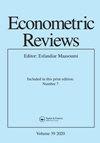In memory of Michael McAleer: special issue of Econometric Reviews
IF 1
4区 经济学
Q3 ECONOMICS
引用次数: 0
Abstract
Our dear friend and world-leading econometrician, Professor Michael John McAleer, passed away on 8 July 2021 after a long and graceful fight with cancer. Mike’s father was Irish and his mother Japanese. His formative years were spent in Japan, with fluency in Japanese and a lifelong affinity with Asian cultures. His grace and good humor during his battle with cancer is an example to all, and a true model of resilience and the power of a positive mental attitude. Mike continued to be a highly active researcher right up until his untimely death. Mike obtained his PhD from Queens University, Canada. Mike spent most of his professional career in Australia, including appointments at the Australian National University and the University of Western Australia. He also held distinguished positions at a number of higher educational institutions spanning several continents. Mike was a passionate debater and thought deeply and argued effectively on the pros and cons of various econometric methods and approaches. His research interests ranged widely in econometrics, financial econometrics, finance, energy economics, economics of patents, bibliometrics, tourism, and lastly COVID-19-related research. Mike was generous and easy to work with and was given to respect and kindness toward his collaborators and students. Michael McAleer is one of the most published econometricians in the world, in a record of scholarly collaboration that is unique in its breadth and width, involving many coauthors, especially younger scholars. In particular, Mike coauthored 415 publications, with 6786 citations, as indicated on Publons, and 1270 referenced pieces on Google Scholar, with 23,273 citations. He was ranked 62 on REPEC for work in economics over a recent 10 year period, 46 in econometrics globally on Google Scholar, and 8 in Financial Econometrics. Mike was also an outstanding Associate Editor of Econometric Reviews, with one of the longest years of service for the journal since the late 1980s. He was the Editor-in-Chief of six international journals and was a member of the editorial boards of forty international journals. Among others, Mike edited and coedited numerous special issues of the Journal of Econometrics, providing timely state of art collections of contributions to the latest topics, some under-covered were it not for his tireless efforts. He contributed to the launching of several journals and showed special sensitivity to the needs of younger scholars. Mike was also a superb host and a great friend, always generous and graceful. He is sorely missed by all those of us who were privileged to call him a friend. This special issue of Econometric Reviews is dedicated to Mike’s memory and honors his contributions as scholar, author, teacher, mentor, and editor. We now provide a short summary of each of the papers (in alphabetical order of the first author) that comprise this special issue, Vol. 42; 9-10. Each was anonymously reviewed in accordance with the usual standards required for publication in Econometric Reviews. In the first paper, Andreou, Anyfantaki, Maasoumi, and Sala demonstrate how extreme value theory can identify stock price crashes, featuring low-probability events that produce large, firmspecific negative outliers in the conditional distribution returns. This is an alternative to the imprecise纪念迈克尔·麦卡利尔:《计量经济学评论》特刊
我们亲爱的朋友、世界领先的计量经济学家迈克尔·约翰·麦卡利尔教授,在与癌症进行了漫长而优雅的斗争后,于2021年7月8日去世。迈克的父亲是爱尔兰人,母亲是日本人。他的性格形成时期是在日本度过的,日语流利,一生都与亚洲文化密切相关。在与癌症的斗争中,他的优雅和幽默是所有人的榜样,是恢复力和积极心态力量的真正典范。迈克一直是一位非常活跃的研究者,直到他英年早逝。迈克在加拿大皇后大学获得博士学位。迈克的大部分职业生涯都在澳大利亚度过,包括在澳大利亚国立大学和西澳大利亚大学任职。他还在几大洲的一些高等教育机构担任过杰出职务。迈克是一个充满激情的辩论家,对各种计量经济学方法和方法的利弊进行了深入的思考和有效的辩论。他的研究兴趣广泛,包括计量经济学、金融计量经济学、金融学、能源经济学、专利经济学、文献计量学、旅游业以及与covid -19相关的研究。迈克很慷慨,很容易相处,对他的合作者和学生都很尊重和友善。Michael McAleer是世界上发表论文最多的计量经济学家之一,其学术合作的广度和广度都是独一无二的,涉及许多共同作者,特别是年轻的学者。特别值得一提的是,迈克与人合著了415篇出版物,引用次数为6786次,如Publons所示,在b谷歌Scholar上合著了1270篇参考文章,引用次数为23,273次。他在近10年的经济学研究中在REPEC排名第62位,在b谷歌Scholar全球计量经济学排名第46位,在金融计量经济学排名第8位。迈克还是《计量经济学评论》杰出的副主编,是自20世纪80年代末以来为该杂志服务时间最长的人之一。他是6个国际期刊的主编,是40个国际期刊的编辑委员会成员。除此之外,迈克还编辑和合编了《计量经济学杂志》的许多特刊,及时提供了对最新主题的最新贡献的艺术收藏,如果不是因为他不懈的努力,有些问题就会被掩盖。他参与创办了几本期刊,并对年轻学者的需求表现出特别的敏感。迈克也是一个出色的主人和一个好朋友,总是慷慨大方。我们有幸称他为朋友的所有人都深深怀念他。本期《计量经济学评论》特刊是为了纪念迈克,并表彰他作为学者、作家、教师、导师和编辑的贡献。我们现在提供了一个简短的摘要,每个论文(按第一作者的字母顺序排列),组成这个特刊,第42卷;9 - 10。根据《计量经济学评论》发表所需的通常标准,对每一篇论文进行匿名评审。在第一篇论文中,Andreou、Anyfantaki、Maasoumi和Sala展示了极端价值理论如何识别股价崩溃,其特点是低概率事件在条件分布回报中产生较大的、特定于企业的负异常值。这是不精确的另一种选择
本文章由计算机程序翻译,如有差异,请以英文原文为准。
求助全文
约1分钟内获得全文
求助全文
来源期刊

Econometric Reviews
管理科学-数学跨学科应用
CiteScore
1.70
自引率
0.00%
发文量
27
审稿时长
>12 weeks
期刊介绍:
Econometric Reviews is widely regarded as one of the top 5 core journals in econometrics. It probes the limits of econometric knowledge, featuring regular, state-of-the-art single blind refereed articles and book reviews. ER has been consistently the leader and innovator in its acclaimed retrospective and critical surveys and interchanges on current or developing topics. Special issues of the journal are developed by a world-renowned editorial board. These bring together leading experts from econometrics and beyond. Reviews of books and software are also within the scope of the journal. Its content is expressly intended to reach beyond econometrics and advanced empirical economics, to statistics and other social sciences.
 求助内容:
求助内容: 应助结果提醒方式:
应助结果提醒方式:


